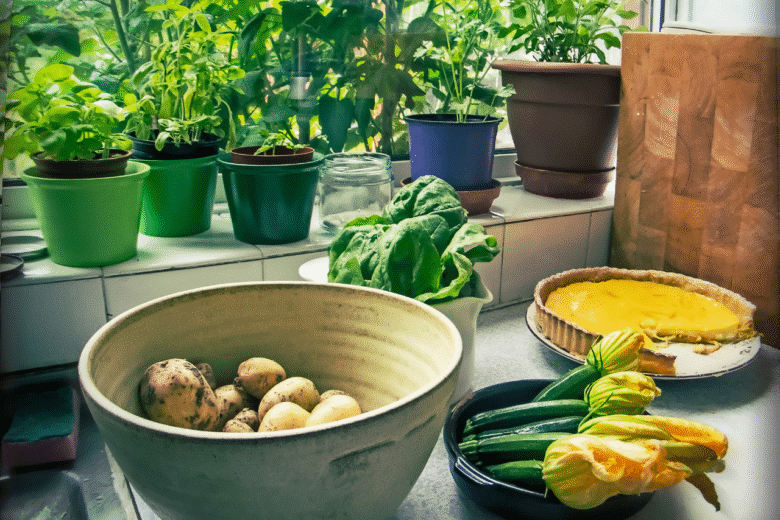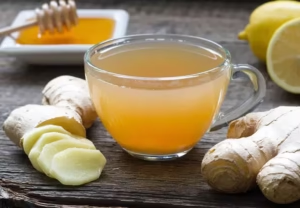Many people turn to expensive supplements or quick-fix remedies when they feel under the weather, yet some of the most effective immune supporters are simple herbs you can find in your kitchen or local market. The problem is, many people don’t know which herbs truly help, or how to use them in a way that makes a difference. A strong immune system means fewer sick days, more energy for daily life, and better long-term health.
In this article, we’ll explore top immune-boosting herbs, how they work, and practical, low-cost ways to include them in your routine. You’ll learn easy recipes, tea blends, and daily habits that make these herbs part of your lifestyle—no expensive equipment or complicated steps required.
1. Garlic – The Everyday Immune Shield
Garlic is more than just a flavor booster in food—it’s a natural defender against infections. Its active compound, allicin, activates when garlic is chopped or crushed. Allicin has antibacterial, antiviral, and antifungal properties, which means it helps your body fight off a wide range of pathogens.
To get the most from garlic, chop or crush a clove and let it rest for about 60 seconds before cooking. This allows the allicin to fully form. Add garlic to soups, stir-fries, stews, or marinades. You can also mix minced raw garlic into salad dressings with olive oil and lemon juice.
If raw garlic feels too strong, roast whole bulbs in the oven until the cloves become sweet and spreadable. Use this on bread or mix into mashed potatoes for a milder, immune-friendly boost.
2. Ginger – Nature’s Anti-Inflammatory
Ginger warms the body, stimulates circulation, and reduces inflammation—all essential for a healthy immune system. It also soothes sore throats and calms the digestive system, which can become stressed when your body is fighting an illness.
For a simple immune tea, slice fresh ginger root and simmer it in water for 10–15 minutes. Add lemon and honey for extra benefits. If you prefer something chilled, brew a strong ginger tea, cool it, and store it in the fridge for a refreshing iced drink.
You can also grate fresh ginger into stir-fries, soups, or marinades for chicken or fish. Powdered ginger works for baking—think ginger cookies or spiced oatmeal—but fresh is generally more potent.
3. Echinacea – The Seasonal Supporter
Echinacea is a flowering plant often used to help the body resist colds and shorten their duration. It works by stimulating the production of white blood cells, which are your immune system’s first line of defense against infection.
You’ll usually find echinacea in tea blends, capsules, or tinctures. The best time to use it is at the very first sign of illness—scratchy throat, tiredness, or mild chills. Many herbalists suggest taking it for about a week at a time, not as a daily, year-round herb.
To enjoy it as tea, steep 1–2 teaspoons of dried echinacea in hot water for 10 minutes. You can combine it with ginger and lemon for added immune support.
4. Turmeric – The Golden Root for Immunity
Turmeric is well known for its active compound curcumin, which has strong antioxidant and anti-inflammatory effects. Chronic inflammation can weaken the immune system over time, so turmeric helps by calming the body’s inflammatory response.
Always pair turmeric with a pinch of black pepper to improve the body’s absorption of curcumin. You can stir turmeric into curries, scrambled eggs, or even rice. For a soothing drink, make “golden milk” by heating milk (or a plant-based alternative) with turmeric, black pepper, cinnamon, and honey.
Turmeric paste—made from turmeric powder, water, and black pepper—can be stored in the fridge and added to hot drinks or soups as needed.
5. Oregano – The Herbal Antimicrobial
Oregano isn’t just a pizza topping—it’s a potent antimicrobial herb. The compounds carvacrol and thymol give oregano its ability to fight bacteria and viruses.
In the kitchen, oregano works well in tomato sauces, roasted vegetables, and salad dressings. Fresh oregano has a strong aroma, but dried oregano is just as beneficial and easier to store.
Oregano oil, available in health stores, is highly concentrated. You can take it in capsule form or dilute it with a carrier oil for oral use. Because it’s so strong, always follow the dosage on the bottle.
6. Holy Basil (Tulsi) – The Stress Reliever
Holy basil, or tulsi, has been used in traditional Ayurvedic medicine for centuries. It supports the immune system partly by lowering stress hormones, which can weaken your body’s defenses.
You can brew tulsi tea using fresh or dried leaves. Its flavor is slightly sweet with a hint of clove, making it pleasant to drink on its own. Drinking tulsi tea in the evening can help you wind down, promoting better sleep—a key factor for immune strength.
If you grow your own tulsi, you can add fresh leaves to soups, stir-fries, or even smoothies.
7. Rosemary – The Circulation Booster
Rosemary improves circulation, helping immune cells move through the body more effectively. It’s also loaded with antioxidants that protect against cell damage.
In cooking, rosemary pairs beautifully with roasted potatoes, chicken, lamb, or vegetables. A sprig of fresh rosemary added to soups or stews can enhance flavor while supporting health.
For a simple rosemary tea, steep fresh sprigs in boiling water for 5–10 minutes. You can drink it warm or cool it down for a refreshing herbal iced tea.
8. Cinnamon – The Warming Protector
Cinnamon’s antimicrobial and anti-inflammatory properties make it another easy addition to your immune-boosting toolkit. It helps regulate blood sugar, which is important because unstable sugar levels can affect immune function.
Add cinnamon to oatmeal, smoothies, or baked goods for a warming flavor. You can also make a simple cinnamon tea by boiling cinnamon sticks in water and adding honey.
Sprinkling cinnamon over sliced apples or adding it to a banana smoothie is an easy way to work it into your snacks.
9. How to Stay Motivated
Building an herbal routine is easier when you start small and stay consistent. Pick one or two herbs you already enjoy and use them in different ways throughout the week. Once that becomes second nature, introduce a new herb.
Keep your herbs visible—on your kitchen counter, in a spice rack, or near your kettle. This visual reminder makes it more likely you’ll reach for them.
Consider joining a local wellness group or online herbal community where people share recipes and tips. Tracking your progress—like noting how often you’ve had your immune tea each week—can help you see your consistency grow. Celebrate small wins with a reward you enjoy, like a relaxing bath or your favorite healthy snack.
Final Thoughts
You don’t need a cabinet full of expensive supplements to strengthen your immune system. A few common herbs, many of which you can buy for just a few cedis or dollars, can make a real difference when used regularly.
Start with one or two herbs you enjoy, experiment with recipes, and see how your body responds. Over time, these small habits build into a strong, resilient immune system. Remember—health isn’t about perfection, but about steady, sustainable steps that you can keep up all year round.
Your kitchen can be your medicine cabinet—use it well.




